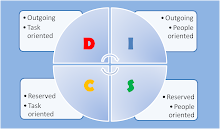Monday, April 5, 2010
From the time they're pretty little, I teach my kids about DISC. At first they learn about their own personality type and then as they mature I keep feeding them information so that they understand other types and how to interact and communicate effectively. It's fun to hear them describe friends or teachers ("You'd love her mom; she's such an I!" or "At first I thought the new math teacher hated me, but then I realized she was just a D.").
So here's how the conversation with my 8 year old went:
"Elle, you've got to be careful. It's really easy for people with your personality type to see the negative stuff in life and completely overlook all of the good stuff. For instance, when your little sister is singing, she really isn't doing it to irritate you. She's just happy and feels like singing. Or maybe you get really upset because you don't like the chicken I made for dinner and you're afraid I'm going to make you eat it. What you're forgetting is that I made your favorite kind of cheesy rice to go along with it and that I'm not the kind of mom who makes you eat stuff you don't like.
"We all have things that come easily to us and other things that we have to work harder at. Like, it's really easy for your little sister to make friends, but it's not so easy for you to talk to new people and get to know them. On the other hand, you are super organized, but your little sister's room usually looks like a tornado has gone through it. You are really good at your schoolwork, but your sister often loses her papers (if she even remembers to bring them home). It doesn't mean you don't have to learn how to make friends or that she doesn't have to learn how to become more organized, it just means that you'll have to work harder at the things that don't come so easily to you. And being positive and happy is something you will actually have to work at. Some people are just naturally happy and some people have to decide to be. "
Okay, so it was more of a monologue than a conversation, but you get the idea. The whole point of it was that because she understands basic personality types, she understood what I was saying. She started to grump about something the very next day and when I looked at her and asked her how she was going to "choose to feel" she glared at me for about 5 seconds and then broke into a smile. After that she'd make a grumpy face every time I turned my head and then would switch back to a smile when I looked at her. It became a game and she had her little sister in stitches.
Thursday, February 11, 2010
Personality Blends
Our five year old is an ID personality type. It’s an interesting combination. She loves to have fun (the I) and she absolutely insists that we all have fun with her (the D). I have seen my C personality husband playing a fake soccer game in the living room just so Annie could pretend she was a cheerleader. When I asked him why he was doing it, he said, “Annie told me to.” I understood immediately. Nobody wants to incur her wrath, so we usually just go along with whatever she says. Actually, she’s very persuasive (the I) and she makes everything sound really great so in the end you think you want to do what she tells you. It’s quite a gift. When it comes to getting her to help with chores, the D in her surfaces and she digs her heels in. I have to give her a choice of chores that she can do so that she feels she has some measure of control (the D). Then I may have to work alongside her and make it fun to keep her on task- - just like I would an I personality type.
My son is an IS blend. You might think they are a lot alike, both being predominantly I’s, but they’re not. He is very fun-loving (the I) but incredibly sensitive (the S). Which means when it comes to chore time for him I have to make it fun and work alongside him (the I), but when he does something wrong I have to be careful the words I use (the S). If it comes out too critical, it absolutely flattens him. It wouldn’t faze my ID daughter in the least, but him… different story.
You see how it works? Just blend the different techniques to match your child’s personality blend. I found a picture of our little ID that I thought summed it up pretty well. Look and see if you can pick out both the I and the D.
Friday, February 5, 2010
Three Year Olds
It’s fun to watch them in a group setting. The outgoing, driven D’s will invariably jockey for position as the line leader and I have the hardest time getting them to let me teach the lesson. I don’t even remotely have the fun-loving I’s attention during the lesson, but when it’s singing time it’s a different story ( I’m sure we can be heard halfway around the building). The sweet, quiet S’s don’t give me any problems and are the ones most likely to be found on my lap. And the detail oriented little C’s take FOREVER to finish their coloring pages and are the first ones to tell me if I vary our routine in the slightest.
Which brings me to my favorite "DISC moment" of the month... a few weeks ago we were listening to a CD in class where a narrator described a scene and the children were acting it out. They were pretending to take a walk in the woods and the narrator said, “Look children! There is a little bunny hopping along the path. Can you hop like a bunny boys and girls?” at which point they all start jumping up and down. Except Andy. Andy is my D. I looked over at him while all of the other children were hopping around the room. Was he hopping? No. He had his imaginary gun pointed at the imaginary bunnies and was picking them off one by one. (insert sigh) Such a D.
Sunday, January 10, 2010
Why Parent with DISC?
- It is so much easier to communicate with each of them. Nothing is more frustrating than being misunderstood. Think of the tantrums of a toddler or the moodiness of a teenager. They primarily stem from the child not being (or not feeling) understood.
- Cooperation is increased. When I need things done or need them to help with something, I know how to get them to help with the least possible resistance (and least amount of whining). The C's love the list. They get such a sense of accomplishment from checking things off. The S's do best when you work alongside them. Make it a game for younger I's, music for the older ones. D's need to have a say in which tasks they do. Give them several to choose from and let them have some control. They're each so much more productive when the tasks are approached in a way they are more comfortable with.
- It's almost like I've got a road map of their natural strengths and weaknesses. It makes it so much easier for me to know which things an individual child needs to overcome (some personality types are more prone to lying... some have problems taking orders... some are more likely to have self-esteem issues... some have a harder time staying on task). Somehow it seems easier when I know that it's not uncommon for a certain personality type to have a particular issue. I have more patience with it.
- There's something really great about understanding how your child is wired. This is harder to explain, but so important. When my oldest daughter was young and I didn't have this information, I remember thinking, "I don't feel like I really know her." We were together all day every day but I just didn't get her. Of course, I later learned we were on opposite sides of the personality spectrum. And while understanding them as young children is great for more cooperation and less whining, understanding them as they get into the teenage years is critical. Their lives take much more serious turns and they will gravitate toward the people who understand them, the people who "get" them.
Honestly, I could go on and on. But I've saved my favorite reason for last. Here's the greatest thing I've noticed from my understanding each of my children's individual personality types... they're happier. Let me give you some examples: I had two daughters sharing a room, an I and a C. They were the odd couple! The C was miserable, the I didn't care. I put the C in her own room and it changed her little world. She keeps this room immaculate. Her clothes are always hung up and her desk is perfectly organized. She is no longer mad at her sister for having to live knee deep in toys. Or how about knowing that my SI son needs me in the room when he does his homework. He can ask me questions, I can help with tougher problems, etc. He just stays on task more easily and then feels better about himself when he gets his homework done (and done right). He invariably hugs me and says, "Thanks, Mom." when he's done. He doesn't really need my help academically... just emotionally. I can do that. I could list instance after instance where my understanding them has led to them being more content, less frustrated, more cooperative... just happier.




